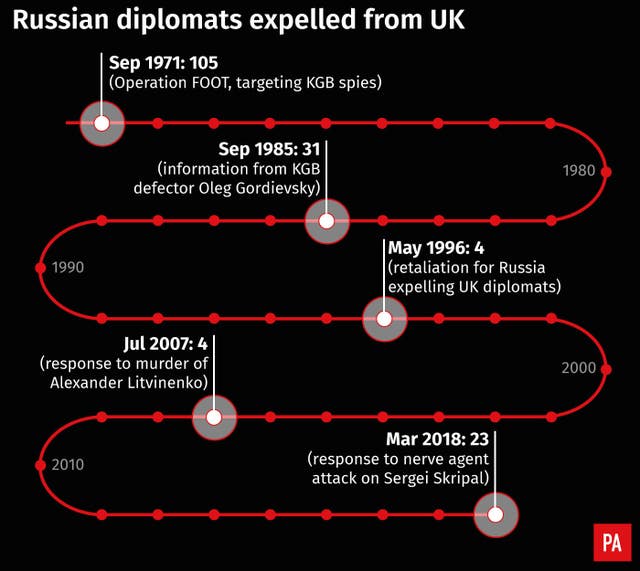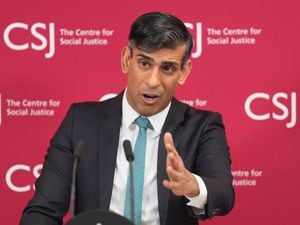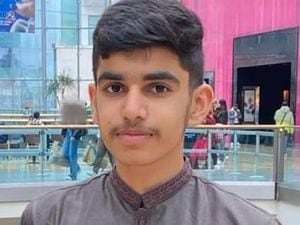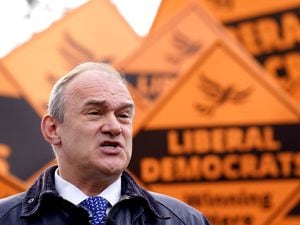Watchdog asked to verify Britain’s findings on Salisbury nerve agent attack
Heated exchanges at the UN Security Council as Russia denies responsibility for the Salisbury attack.

Britain has asked the international chemical weapons watchdog to verify its findings that Moscow is behind the nerve agent attack in Salisbury.
The news came after Prime Minister Theresa May confirmed the UK will expel 23 suspected Russian spies over the incident.
The UK’s deputy UN ambassador, Jonathan Allen, told a special meeting of the Security Council that the Organisation for the Prohibition of Chemical Weapons has been called on to go over the British analysis of the attack.
In heated exchanges at the Security Council gathering, Russia strongly denied it was involved in the Salisbury incident, and the US offered Britain its full support.
The Russian permanent representative to the UN, Vassily Nebenzia, said: “We demand that material proof be provided of the allegedly found Russian trace in this high-resonance event.
“Without this, stating that there is incontrovertible truth is not something that we can take into account.”
US ambassador to the UN Nikki Haley gave the strongest American support for the UK’s position so far in the dispute.
She said: “The United States stands in absolute solidarity with Great Britain.
“The United States believes that Russia is responsible for the attack on two people in the United Kingdom using a military-grade nerve agent. Dozens of civilians and first responders were also exposed.
“If we don’t take immediate concrete measures to address this now, Salisbury will not be the last place we see chemical weapons used. This is a defining moment.”
The UN showdown came after Mrs May announced the largest mass expulsion of diplomats since the Cold War, as relations with Moscow plunged into the deep-freeze.
She announced the suspension of high-level contacts with Russia, including a boycott of this summer’s World Cup by Government ministers and members of the royal family.
And she said Russian state assets will be frozen “wherever we have the evidence that they may be used to threaten the life or property of UK nationals or residents”.
Russia’s Ministry for Foreign Affairs branded Mrs May’s statement as “an unprecedentedly crude provocation that undermines the foundations of a normal interstate dialogue between our countries”.
The Ministry said: “We consider it categorically unacceptable and unworthy that the British Government, in its unseemly political aims, further seriously aggravated relations, announcing a whole set of hostile measures, including the expulsion of 23 Russian diplomats from the country.”
Mrs May said Russia had failed to provide a “credible” explanation for how the Novichok nerve agent which it had developed came to be used in the attack on the Skripals, who remain in hospital after being found slumped on a bench on March 4.
She told MPs: “This represents an unlawful use of force by the Russian state against the United Kingdom.”

The 23 Russian diplomats identified as undeclared intelligence officers have been given a week to leave, in the largest mass expulsion since 31 were ordered out in 1985 following the defection of double agent Oleg Gordievsky.
Mrs May told MPs the Government will also develop new powers “to harden our defences against all forms of hostile state activity”, including by tightening checks on cross-border movements of those who may endanger UK security.
Labour leader Jeremy Corbyn was barracked by Conservative MPs as he asked the Prime Minister how she had responded to requests from the Russian government for a sample of the nerve agent used in the attack so it could run its own tests.
Condemning the Salisbury incident as a “dreadful, appalling act”, Mr Corbyn called for multilateral action in response and said it was a matter of “huge regret” that the UK’s diplomatic network had been cut by 25% in the last five years.
Mr Corbyn drew criticism after his spokesman said the history of information from UK intelligence agencies is “problematic” and refused to say that the Labour leader accepted the Russian state was at fault.





